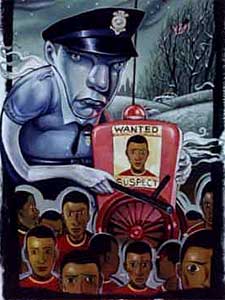|
Photos
More from MPR
Resources
Your Voice
|
Report: Police stop minorities more often than whites
September 24, 2003
 |
| Racial profiling depicted in a painting by Minneapolis artist Ryan Kelly. (Racial Profiling painting by Ryan Kelly. Used by permission) |
St. Paul, Minn. — While Minneapolis and St. Paul have already collected such data on police stops, this study marks the first time such data has been collected from rural law enforcement jurisdictions. The majority of law enforcement agencies in the state chose not to participate in the study. However, researchers say it would be safe to assume that the data represents what goes on throughout the state.
"The data suggests a broad and clear disparity that's hard to explain with any other reason than race," says Myron Orfield, director of the Institute on Race and Poverty at the University of Minnesota.
Orfield says the report tracks the differences between the actual and expected numbers of traffic stops based on the number of people of driving age living in any given jurisdiction. For example, if African Americans make up 7 percent of all people of driving age in a county, then one would expect that 7 percent of all the people stopped by police officers would be African American.
Orfield says African Americans and Latinos are being 'overstopped,' and 'oversearched.'
|
African Americans and Latinos are twice as likely -- sometimes three times as likely -- to be stopped, and very much more frequently searched.
- Myron Orfield, the Institute on Race and Poverty |
"It's a broad, clear disparity that shows that African Americans and Latinos are twice as likely -- sometimes three times as likely -- to be stopped, and very much more frequently searched," says Orfield. "And when they are searched they are less likely to find contraband. It's clear and consistent throughout the state in every pattern."
Researchers say the methodology used in the study is commonly used to measure racial profiling. However, they say there are limitations. Gavin Kearney says the data doesn't account for the fact that not everyone who is old enough to drive, actually drives.
"It only includes the residents of jurisdictions. We weren't able to determine the extent of which those stopped during the traffic stop period during 2002 may not have been residents of the jurisdiction," says Kearney.
The study is the result of legislation passed in 2001, which offered state funding to jurisdictions who volunteered to document the race of the drivers stopped by its police officers. The law mandated that the data be collected for one year and the results be made public.
Public Safety Commissioner Rich Stanek was instrumental in passing that legislation when he was a member of the House two years ago. Stanek says he doesn't think the numbers necessarily mean officers are discriminating against drivers of color. However, he says they are concerning.
"One of the most important or significant and positive results that can occur as a result of this study is to use that data to further strengthen those relationships between those local law enforcement agencies and the people they serve," says Stanek.
Stanek says the Department of Public Safety will help facilitate a number of police/community meetings. And he mentioned that data collection is just one of several parts of the racial profiling legislation. Stanek says the state Police Officer Standards and Training Board, as well as other police departments across the state, have implemented "impartial policing" procedures.
Gayle Kall says she's not surprised at the findings that show drivers of color are more likely to be pulled over in rural cities like Rochester. Kall is the chair of the Human Rights Commission in Olmstead County. She says the commission and civil rights groups like the NAACP are working with the police department to address racial profiling, but more needs to be done soon.
"I can tell you that people are frustrated in Rochester. Rochester has a reputation of kind of wanting to sweep things under the rug. And I think that it's just going to blow in our face," says Kall.
Researchers made recommendations with the report. One suggests continued statewide data collection in order to track trends in police stops. However, the racial profiling legislation only called for the collection of data for one year.
|
News Headlines
|
Related Subjects
|
